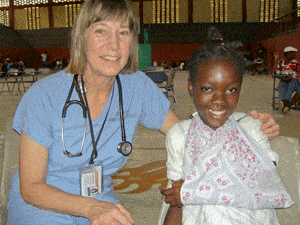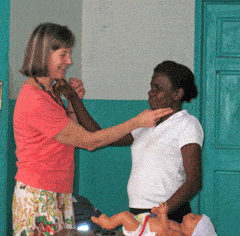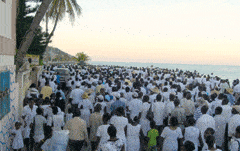Carole Kuhn ’73
Carol Kuhn ’73: Improving Health Care in Haiti
By Ann Pauley
Dr. Kuhn ’73 made her ninth trip as a medical volunteer to Cap-Haitien, Haiti, just 19 days after the catastrophic earthquake. “While walking to the hospital I was met by thousands of people dressed in white, walking and singing in a prayer parade,” she recalls. “They were giving thanks to God for sparing Cap-Haitien and asking forgiveness. It was very moving; it was a flowing mixture of sorrow and joy. It was representative of the Haitian people, who are resilient and optimistic despite the odds against them.”

Carol Kuhn ’73 with a patient in Haiti
The port city of Cap-Haitien, Haiti’s second largest city, is 80 miles north of Port-au-Prince, where the earthquake struck. Although Cap-Haiten did not sustain any damage, it has been affected as more than 30,000 Haitians from Port-au-Prince migrated north and are living with family and friends in the Cap-Haitien area.
Kuhn, who is a partner in a family practice in Belfast, Maine, has been a volunteer with Konbit Sante Cap-Haitien Health Partnership since 2006. Founded in 2000, Konbit Sante is a Maine-based volunteer partnership committed to saving lives and improving health care in northern Haiti. In Haitian Creole, a konbit is a traditional Haitian method of working together to till your friends’ fields as well as your own – a cooperative effort. Sante means health, so the name Konbit Sante means working together for health. Konbit Sante is different from many organizations in that it does not send teams of doctors and nurses to provide hands-on care. Instead, staff and volunteers work with the Haitian Ministry of Health and Haitian colleagues to develop health care programs, teach doctors and nurses, collect and deliver much-needed medical equipment and supplies, and make infrastructure improvements that build capacity within the public health system for Haitians to care for Haitians.
The people of Haiti endure some of the worst health conditions in the world. Haiti is the poorest country in the western hemisphere. Two-thirds of all Haitians are malnourished and do not have access to the most basic healthcare. There is no public sanitation system anywhere in Haiti and little potable water. Haiti is rated last in the world on the Water Poverty Index and has the highest maternal mortality ratio in the western hemisphere. One in twelve children does not survive to age five. HIV, tuberculosis, malaria and dengue fever rates are the worst in this hemisphere and contribute to the low life expectancy and poor health of the people of Haiti.
Konbit Sante’s efforts are focused on the Justinian Hospital and Fort St. Michel public health center, which serves 40,000 people on the outskirts of the city of Cap-Haitien. Kuhn primarily works with eight “agent sante” (community health workers). She trains them, assesses their work and supports their efforts to provide health care. “The Fort St. Michel neighborhoods are built on refuse,” notes Kuhn. “The agent sante provide health care and education in homes and refer patients to the clinic for tuberculosis and malaria treatment, immunizations and routine health care.” Konbit Sante supplies the salaries for these dedicated, highly motivated community health workers.

Carol Kuhn teaching a native Haitian how to take a person’s pulse.
“I am always energized and humbled by the agent sante when I work with them,” says Kuhn. “They are hard working, resourceful, intelligent and eager to learn more and expand their skills. They are great motivational speakers; they grasp material and enthusiastically share it with others in small groups. They are well respected in their communities and discouraged that they do not have more to offer families.”
Kuhn worked closely with the agent sante when Konbit Sante trained them to use GPS devices to create a census of their work areas, which was later used for tracking the effect of the distribution of a medication for the treatment of hookworm disease. “We taught them how to perform anemia screening, obtain informed consent, perform quality control tests and maintain record keeping,” she recalls. “Like so many in Haiti, they are poor, but they have great pride in their accomplishments and they show unflagging concern for their patients and neighbors. They are discouraged by the poverty, lack of sanitation and Haiti’s isolation. But they persevere and are quick to be joyful and share delight in small things – someone’s gesture, a child’s attempt to tease, a passing friend’s greeting.”
Although Konbit Sante volunteers do not usually provide direct care, that changed in the wake of the earthquake. Many victims of the earthquake were transferred to the Justinian Hospital and some of the people who relocated from Port-au-Prince required medical care. “I treated patients in a make-shift triage and primary care clinic, which was set up in a gymnasium near the hospital,” notes Kuhn. “Hundreds of displaced people waited in long lines. Their stories were heart-rending; injuries and physical complaints were minor compared to their personal and national losses. The gymnasium also served as a resource and food distribution center.”
Kuhn’s journey from Trinity to her practice in rural Maine and her volunteer work in Haiti is an interesting one. At Trinity, she majored in American studies and English; she studied in Oxford during her sophomore year and was inducted into Phi Beta Kappa.
“I entered Trinity when I was 17 years old in 1969,” Kuhn recalls, “the year after the Columbia University student uprising and the 1968 student protests in France. In October 1969, I participated in the anti-Vietnam War candlelight vigil surrounding the White House. Students and faculty engaged in open dialogue during my years at Trinity. I was impressed with the intelligence and integrity of our professors, who were almost all women. It was an exciting, but serious time marked by the Vietnam War, Watergate and academic ‘revolutions.’ Trinity seemed very progressive then, compared to the other universities in Washington. There was a sense of no boundaries for what women could aspire to achieve. The mind and spirit were exercised and intertwined at Trinity.”
Kuhn grew up in New Jersey and, although her father was an orthopedic surgeon, she wanted to do something “outside of the hierarchy of the traditional medical system. I think it was all my Girl Scout experiences and training in high school in first aid, CPR and life saving courses, and the water safety instructor courses that I took in college, that informed my need to do something of use – something with my hands.”

A Prayer Parade in Haiti
“The new physician assistant concept suited my outlook and my desire to be of use,” says Kuhn, so she enrolled at Duke University, which pioneered physician assistant training. After she graduated, Kuhn spent a year in hospital emergency rooms. She then joined the National Health Service Corps and moved to Kezar Falls, Maine, where she worked for 12 years as a physician assistant in a rural health center one hour away from the nearest hospital.
When she decided to become a doctor, she first took pre-med courses in Portland, Maine, then attended the University of Vermont College of Medicine, where, at 40, she was the second oldest student in her class. She joined the Seaport Family Practice in 1999, where she enjoys working with patients across the age spectrum, from newborn babies to older patients in nursing homes.
Kuhn is particularly interested in geriatric medicine because “the elder generation’s wisdom and approach to life excites me,” she says. “I have always been drawn to life stories of times past, lessons learned, transitions made. Last fall I started an elder women’s support group called ‘What the Heck!’ About 10 women ages 70 to 91 meet with the goal of conversation, friendship and hope. The group is remarkable; none knew each other, but from the start they ‘connected’ and shared stories and challenges. We discuss topics such as worries, friendship, what we want to do or where we want to go in the remaining years. Their sense of humor and acceptance of life inspired the name of the group.”
In her free time, Kuhn is happiest in and on the water, swimming, kayaking and sailing. When on land, she likes to hike, garden and cross county ski, and enjoys spending time with her large, extended family. Many of Kuhn’s relatives graduated from Trinity, including her late grandmother, Helen Linehan Porter, Class of 1907, her late mother, Margaret Porter Kuhn ’41, and her aunt, Alice Porter McNamara ’48. Two more aunts, the late Eleanor Porter Curry ’39 and the late Mary Porter Herring ’37, also graduated from Trinity.
Kuhn will continue to return to Haiti, using her vacation time to go there twice a year. In the wake of the earthquake, the challenges are great. Kuhn notes, “There will be long-term earthquake-related healthcare burdens for all of Haiti, which makes Konbit Sante’s primary mission of capacity building, helping Haitians support Haitians, even more critical.”
For more information visit www.konbitsante.org